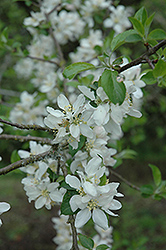It's all about ...
plants

Niedzwetzkyana Flowering Crab
Malus pumila 'Niedzwetzkyana'
Height: 20 feet
Spread: 15 feet
Sunlight:
![]()
Hardiness Zone: 4a
Other Names: Roseybloom, Crabapple
Description:
Spectacular rose-purple blooms cover broadly sweeping branches in springtime; young leaves, stems and wood are purplish-red; the striking crimson colored fruit is edible but not flavorful
Ornamental Features
Niedzwetzkyana Flowering Crab is clothed in stunning clusters of fragrant rose flowers along the branches in early spring before the leaves. It has attractive dark green deciduous foliage which emerges burgundy in spring. The pointy leaves are highly ornamental and turn yellow in fall. The fruits are showy crimson apples with hints of purple, which are carried in abundance from early to late fall.
This plant is primarily grown as an ornamental, but it's also valued for its edible qualities. The small round mild apples are most often used in the following ways:
- Cooking
- Preserves
Landscape Attributes
Niedzwetzkyana Flowering Crab is a deciduous tree with a shapely form and gracefully arching branches. Its average texture blends into the landscape, but can be balanced by one or two finer or coarser trees or shrubs for an effective composition.
This tree will require occasional maintenance and upkeep, and is best pruned in late winter once the threat of extreme cold has passed. It is a good choice for attracting birds and bees to your yard. It has no significant negative characteristics.
Niedzwetzkyana Flowering Crab is recommended for the following landscape applications;
- Accent
- General Garden Use
Planting & Growing
Niedzwetzkyana Flowering Crab will grow to be about 20 feet tall at maturity, with a spread of 15 feet. It has a low canopy with a typical clearance of 2 feet from the ground, and is suitable for planting under power lines. It grows at a medium rate, and under ideal conditions can be expected to live for 50 years or more.
This tree should only be grown in full sunlight. It does best in average to evenly moist conditions, but will not tolerate standing water. It is not particular as to soil type or pH. It is highly tolerant of urban pollution and will even thrive in inner city environments. Consider applying a thick mulch around the root zone in winter to protect it in exposed locations or colder microclimates. This is a selected variety of a species not originally from North America.
This plant is not reliably hardy in our region, and certain restrictions may apply; contact the store for more information.
